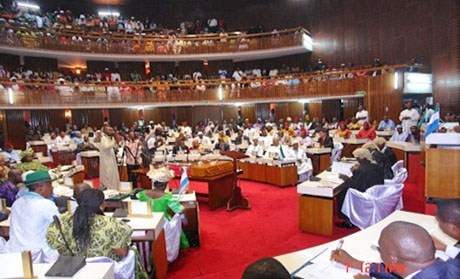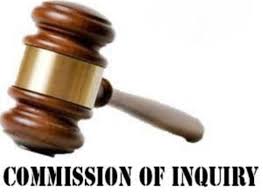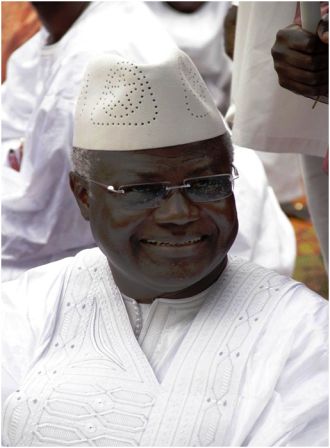Keynote Address By His Excellency the President Dr. Ernest Bai Koroma
Launching ceremony of the Constitutional Review Committee on 30 July, 2013 (Photo: HE President Ernest Bai Koroma)
We are gathered here today to launch the committee that will review the constitution of our dear country. This is a committee constituted from people of every region, political affiliation and socio-economic group to perform a sacred task. The constitution is the supreme law of the land, and we must all ensure that this document captures our better habits, our better values and our better aspirations.
We are amongst the most religiously tolerant of nations, let that tolerance be expanded upon and deepened in our review. We are a nation of diverse ethnic groups, but we share common cuisines, religions, secret societies, surnames and many more; let that unity in diversity be reflected in the inclusiveness of our constitution. We are a friendly people, let the constitution be people friendly, easy to understand, and easy to follow. Let it be a constitution that follows this wise dictum: do not command that which you cannot enforce.
We are a nation that draws great strength from a noble pact amongst Africans, Europeans and Americans to end slavery and spread freedom, enterprise and eternal values; our constitution must reflect these foundational ideals of this realm of the free. We are a nation that has seen the evils of war, a people that have tasted the bitterness of violent conflict and suffered the depravations of forcible displacements and banishments; we must ensure a constitution that protects us from the causes and practices of these humiliations.
Compatriots, distinguished ladies and gentlemen, our country has the deepest tradition of written constitutionalism in West Africa, starting with the constitution fashioned by Granville Sharpe for the freed men and women of the Province of Freedom, to the Blackhall Constitution of 1863, the Slater Constitution of 1924 and the Stevensons Constitution of the 1950s. We gained independence with a constitution modeled along a monarchist Westminster model; we established a republican presidential system in 1971, a one party constitution in 1978 and reverted to a multi-party system in 1991.
We have had constitutions imposed from above, with little regard for the opinions of the people, but we have also had constitutions that sought inputs and mandate from the people of this great nation. We have had constitutions that require ministers to be drawn from parliament, and we now have a constitution which does not allow the same person to be a minister and a parliamentarian. We have had systems of government, from the settlement of Granville Town to the independent Kingdoms of the hinterland, that were constituted by representatives of the people, or that were in accord with the customs and tradition of our people. We have gone full circle with electoral systems, starting from elections of hundredors to indirect suffrage, to first pass the post system, the national proportional list system, the district block system and once again to the first pass the post system. We have had models in which the head of government was elected by parliament to one in which the people directly elect the president. We have had and rejected spells of military dictatorships, but we have also for most part of our history rightly subjected the military to civilian oversight and control.
Our governance and constitutional history gives us a library of lessons to draw from; in it we can find a veritable storehouse of good governance practices, and also aspirations for a better covenant between the people and their government. But we must also note that our constitutional history has its low points of compromising statutes, acrimonious debates, and democratic deficits. We must strive to assert the better moments of this history, and avoid a repeat of acrimony, imposition and despotism.
Constitutions, they say, must stand the test of time. I strongly believe in this imperative; and I pray that the constitution that we may fashion through this process is more enduring. But I also equally acknowledge that our Constitution, like every creation worthy of its existence, makes provision for its own renewal. Our Constitution makes that provision for renewal in Section 108. By launching this Constitutional Review Committee, we are obeying this great constitutional mandate to renew the constitution. This is a nation that is renewing itself. This is a nation buoyant with energy, with youth, with novel but humane aspirations. It is but fitting that our most fundamental of documents captures this renewal, that it reflects this dynamism, and that it is opened up to the possibilities of a nation that aspires to have a developmental state, a democratic society and a tolerant culture.
We committed ourselves, at the end of the war, in the Lome Peace Agreement, to fundamentally review the constitution, and our parliament itself, by enacting the agreement into law re-affirms the mandate for a review. The Truth and Reconciliation Commission called upon us to do it. The Sierra Leone Conference on Development and Transformation urged us to align our fundamental laws with our aspirations to become a middle-income country and donor nation.
Women are advocating for the review of the 1991 constitution to ensure that we do not have a constitution that protects and promotes their rights with one hand and then draws back these protections in other clauses. Youths and the physically challenged are demanding greater inclusion within government processes; and we have many governance reforms and aspirations, from decentralization to gender equity that are not properly anchored in the constitution. These are the imperatives that propel this review; they are the reasons for the establishment of this committee, and we urge this committee to be true to the better aspirations of our people.
Compatriots, distinguished ladies and gentlemen, I took an oath, on becoming President, to uphold the constitution. Today, I once again recommit my government to honor, respect, and uphold the letter and the spirit of Constitution in Section 108 that provides for the alteration of this constitution. This review shall be true to the processes prescribed in the constitution for its alteration. The committee will submit its recommendations to my Government. Government will in turn look into the report, and submit it to parliament. If parliament approves, it will then be put into a referendum for the people to decide the fate of the proposed covenant.
All of us must also ensure that this process meets best international practice of modern constitutionalism. That is the only way we can become a truly modern nation, a nation at peace with itself and the global community, and a nation that can be counted amongst the best-governed societies in the world. This is why I call upon you to align our constitution with these basic elements of modern constitutionalism: supremacy of the constitution, the rule of law, respect for human rights, separation of powers, checks and balances, independence of the judiciary, judicial review, equality before the law, civilian oversight/ subordination of the military to civilian authority, and free and fair elections.
We also charge this committee to look into earlier constitutions of our country, the report of the Truth and Reconciliation Commission, the report of the Sierra Leone Conference on Development and Transformation, and the Report of the Peter Tucker Constitutional Review Commission which was established in 2006, and that submitted its findings to government in 2008.
Compatriots, distinguished ladies and gentlemen, when Granville Sharpe wrote a constitution for the Province of Freedom, he derived inspirations from Jethro’s words unto Moses in Exodus 18: 21 that governments must be constituted from amongst persons who are able, persons who fear God, and persons of truth who hate covetousness. Islamic traditions also call for governance to be based on a Shura of wise counsels that respects majority opinion, protect the vulnerable and uphold justice. These are ideals that must be evident in our supreme document; they must be evident in those called upon to serve; they must be evident in the deliberations of this Constitutional Review Committee.
We trust that this committee will not seek to impose its opinion on the people. We expect this Constitutional Review Committee to host public consultations in ways that allow every citizen to make a contribution. These consultations must not be centered within one specific area or region, but should span the length and breadth of Sierra Leone. The Committee should also take advantage of other technological developments and receive submissions electronically to encourage the widest possible public participation. We also urge all Sierra Leoneans, from every region, every district, ethnic group, and political and religious affiliation to support the process, fully participate in it, and take ownership of the review. This is the best way to make the resulting document a true covenant amongst all of us to honor our common aspirations. Good constitutions are not imposed. Democratic constitutions are covenantal, they are genuine pacts amongst citizens to constitute themselves into a polity that they would love and honor and whose interests they would put above all else.
That is why it is of great import that this process be all embracing and inclusive; that is why it is important that everybody should have a dignified and equitable place in the power-map of the nation; that is why we must have a supreme document through which we can answer some of the most pressing challenges since the founding of our nation.
Since the enactment of the 1991 Constitution, a number of issues have arisen relating to certain of its sections and provisions. I urge this committee to pay attention to these sections. We must act to remove constitutional ambiguities, ensure greater clarity of our statutes; and rationalize our governance processes.
I believe that this process will yield a worthy outcome. I believe that this nation is capable of coming up with a constitutional model that will ensure inclusive, accountable and developmental governance. We shall rise up to the challenge, we shall ensure a fundamental document that democratically guides the renewal of this nation, and we must make this moment worthy of the best instances of our history and the better aspirations of the people of this country. So that our children and grandchildren shall refer to this moment as they give voice to the immortal words of our anthem: realm of the free, firmly united, land that we love, our Sierra Leone.
God bless Sierra Leone
I thank you for your attention.
HE President Ernest Bai Koroma, State House, Sierra Leone
Stay with Sierra Express Media, for your trusted place in news!
© 2013, https:. All rights reserved.





